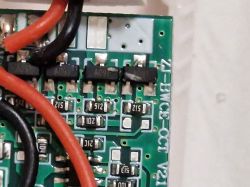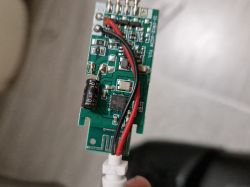I have not seen any evidence this is being looked into

Czy wolisz polską wersję strony elektroda?
Nie, dziękuję Przekieruj mnie tam


components/network/wifi/include/supplicant_api.hWPA3_AUTH_PSK = 0x09,INCLUDE_COMPONENTS += freertos_riscv_ram bl602 bl602_std newlibc hosal mbedtls_lts lwip vfs yloop utils cli blog blog_testc coredump
# INCLUDE_COMPONENTS += freertos_riscv_ram bl602 bl602_std hal_drv vfs yloop utils cli blog blog_testc(venv) MyTest@Virtual-Ubuntu-24:~/dev/bl_iot_sdk-master/customer_app/bl602_sharedApp$ ./genromap
use existing version.mk file
/home/MyTest/dev/bl_iot_sdk-master/customer_app/bl602_sharedApp/bl602_sharedApp/main.c: In function 'aos_loop_proc':
/home/MyTest/dev/bl_iot_sdk-master/customer_app/bl602_sharedApp/bl602_sharedApp/main.c:753:9: error: too few arguments to function 'vfs_uart_init'
753 | vfs_uart_init(fdt, offset);
| ^~~~~~~~~~~~~
In file included from /home/MyTest/dev/bl_iot_sdk-master/customer_app/bl602_sharedApp/bl602_sharedApp/main.c:54:
/home/MyTest/dev/bl_iot_sdk-master/components/fs/vfs/include/device/vfs_uart.h:91:5: note: declared here
91 | int vfs_uart_init(uint32_t fdt, uint32_t dtb_uart_offset, const char *node[], int node_max);
| ^~~~~~~~~~~~~
/home/MyTest/dev/bl_iot_sdk-master/customer_app/bl602_sharedApp/bl602_sharedApp/shared/src/driver/drv_openWeatherMap.c: In function 'sendQueryThreadInternal':
/home/MyTest/dev/bl_iot_sdk-master/customer_app/bl602_sharedApp/bl602_sharedApp/shared/src/driver/drv_openWeatherMap.c:163:10: error: 'return' with a value, in function returning void [-Werror=return-type]
163 | return 1;
| ^
/home/MyTest/dev/bl_iot_sdk-master/customer_app/bl602_sharedApp/bl602_sharedApp/shared/src/driver/drv_openWeatherMap.c:137:13: note: declared here
137 | static void sendQueryThreadInternal() {
| ^~~~~~~~~~~~~~~~~~~~~~~
/home/MyTest/dev/bl_iot_sdk-master/customer_app/bl602_sharedApp/bl602_sharedApp/shared/src/driver/drv_openWeatherMap.c:167:10: error: 'return' with a value, in function returning void [-Werror=return-type]
167 | return 1;
| ^
/home/MyTest/dev/bl_iot_sdk-master/customer_app/bl602_sharedApp/bl602_sharedApp/shared/src/driver/drv_openWeatherMap.c:137:13: note: declared here
137 | static void sendQueryThreadInternal() {
| ^~~~~~~~~~~~~~~~~~~~~~~
/home/MyTest/dev/bl_iot_sdk-master/customer_app/bl602_sharedApp/bl602_sharedApp/shared/src/cmnds/cmd_main.c: In function 'CMD_PowerSave':
/home/MyTest/dev/bl_iot_sdk-master/customer_app/bl602_sharedApp/bl602_sharedApp/shared/src/cmnds/cmd_main.c:111:3: error: implicit declaration of function 'wifi_mgmr_sta_powersaving'; did you mean 'wifi_mgmr_sta_ps_exit'? [-Werror=implicit-function-declaration]
111 | wifi_mgmr_sta_powersaving(2);
| ^~~~~~~~~~~~~~~~~~~~~~~~~
| wifi_mgmr_sta_ps_exit
/home/MyTest/dev/bl_iot_sdk-master/customer_app/bl602_sharedApp/bl602_sharedApp/main.c: In function '_dump_boot_info':
/home/MyTest/dev/bl_iot_sdk-master/customer_app/bl602_sharedApp/bl602_sharedApp/main.c:864:10: error: 'BL_SDK_VER' undeclared (first use in this function)
864 | puts(BL_SDK_VER); // @suppress("Symbol is not resolved")
| ^~~~~~~~~~
/home/MyTest/dev/bl_iot_sdk-master/customer_app/bl602_sharedApp/bl602_sharedApp/main.c:864:10: note: each undeclared identifier is reported only once for each function it appears in
/home/MyTest/dev/bl_iot_sdk-master/customer_app/bl602_sharedApp/bl602_sharedApp/main.c:868:10: error: 'BL_SDK_STDDRV_VER' undeclared (first use in this function)
868 | puts(BL_SDK_STDDRV_VER); // @suppress("Symbol is not resolved")
| ^~~~~~~~~~~~~~~~~
/home/MyTest/dev/bl_iot_sdk-master/customer_app/bl602_sharedApp/bl602_sharedApp/main.c:872:10: error: 'BL_SDK_PHY_VER' undeclared (first use in this function)
872 | puts(BL_SDK_PHY_VER); // @suppress("Symbol is not resolved")
| ^~~~~~~~~~~~~~
/home/MyTest/dev/bl_iot_sdk-master/customer_app/bl602_sharedApp/bl602_sharedApp/main.c:876:10: error: 'BL_SDK_RF_VER' undeclared (first use in this function)
876 | puts(BL_SDK_RF_VER); // @suppress("Symbol is not resolved")
| ^~~~~~~~~~~~~
/home/MyTest/dev/bl_iot_sdk-master/customer_app/bl602_sharedApp/bl602_sharedApp/shared/src/driver/drv_openWeatherMap.c:167:10: error: 'return' with a value, in function returning void [-Werror=return-type]
167 | return 1;
overriding recipe for target 'freertos_riscv_ram'
/home/runner/work/OpenBK7231T_App/OpenBK7231T_App/sdk/OpenBL602/customer_app/bl602_sharedApp/../../make_scripts_riscv/project.mk:570: warning: ignoring old recipe for target 'freertos_riscv_ram'
/home/runner/work/OpenBK7231T_App/OpenBK7231T_App/sdk/OpenBL602/customer_app/bl602_sharedApp/../../make_scripts_riscv/project.mk:570: warning: overriding recipe for target 'hosal'
/home/runner/work/OpenBK7231T_App/OpenBK7231T_App/sdk/OpenBL602/customer_app/bl602_sharedApp/../../make_scripts_riscv/project.mk:570: warning: ignoring old recipe for target 'hosal'
make[1]: execvp: mkdir: Argument list too long
make[1]: execvp: mkdir: Argument list too long
make[1]: execvp: mkdir: Argument list too long
make[1]: execvp: mkdir: Argument list too long
make[1]: execvp: mkdir: Argument list too long
make[1]: execvp: mkdir: Argument list too long
make[1]: execvp: mkdir: Argument list too long
make[1]: execvp: mkdir: Argument list too long
make[1]: execvp: mkdir: Argument list too long
make[1]: execvp: mkdir: Argument list too long
make[1]: execvp: mkdir: Argument list too long
make[1]: execvp: mkdir: Argument list too long
make[1]: execvp: mkdir: Argument list too long
make[1]: execvp: mkdir: Argument list too long
make[1]: execvp: mkdir: Argument list too long
make[1]: execvp: mkdir: Argument list too long
make[1]: execvp: mkdir: Argument list too long
make[1]: execvp: mkdir: Argument list too long
make[1]: execvp: mkdir: Argument list too long
make[1]: execvp: mkdir: Argument list too long
make[1]: execvp: mkdir: Argument list too long
make[1]: execvp: mkdir: Argument list too long
make[1]: execvp: mkdir: Argument list too long
make[1]: execvp: mkdir: Argument list too long
make[1]: execvp: mkdir: Argument list too long
make[1]: execvp: mkdir: Argument list too long
make[1]: execvp: mkdir: Argument list too long
make[1]: execvp: mkdir: Argument list too long
make[1]: execvp: mkdir: Argument list too long
make[1]: execvp: mkdir: Argument list too long
make[1]: execvp: mkdir: Argument list too long
make[1]: execvp: mkdir: Argument list too long
make[1]: *** No rule to make target '/home/runner/work/OpenBK7231T_App/OpenBK7231T_App/sdk/OpenBL602/customer_app/bl602_sharedApp/build_out/bl602', needed by '/home/runner/work/OpenBK7231T_App/OpenBK7231T_App/sdk/OpenBL602/customer_app/bl602_sharedApp/build_out/bl602/component_project_vars.mk'. Stop.
make[1]: Leaving directory '/home/runner/work/OpenBK7231T_App/OpenBK7231T_App/sdk/OpenBL602/customer_app/bl602_sharedApp'
make: *** [Makefile:177: OpenBL602] Error 2
riscv64-unknown-elf-gcc: fatal error: cannot execute 'cc1': execvp: No such file or directory/home/MyTest/dev/bl_iot_sdk-master/toolchain/riscv/Linux/bin/../lib/gcc/riscv64-unknown-elf/10.2.0/../../../../riscv64-unknown-elf/bin/ld: /home/MyTest/dev3/OpenBL602-master/customer_app/bl602_sharedApp/build_out/bl602_sharedApp/libbl602_sharedApp.a(main.o): in function `app_delayed_action_init':
/home/MyTest/dev3/OpenBL602-master/customer_app/bl602_sharedApp/bl602_sharedApp/main.c:71: undefined reference to `Main_Init'
/home/MyTest/dev/bl_iot_sdk-master/toolchain/riscv/Linux/bin/../lib/gcc/riscv64-unknown-elf/10.2.0/../../../../riscv64-unknown-elf/bin/ld: /home/MyTest/dev3/OpenBL602-master/customer_app/bl602_sharedApp/build_out/bl602_sharedApp/libbl602_sharedApp.a(main.o): in function `app_delayed_action_1000ms':
/home/MyTest/dev3/OpenBL602-master/customer_app/bl602_sharedApp/bl602_sharedApp/main.c:76: undefined reference to `Main_OnEverySecond'
find ./ -type f -exec chmod 644 {} \;
![[LF686C20] [BL602] Magic Home RGBW 12-24v 5-pin LED Strip Controller [LF686C20] [BL602] Magic Home RGBW 12-24v 5-pin LED Strip Controller](https://obrazki.elektroda.pl/5311576800_1748353881_thumb.jpg)
Info:MAIN:Time 1375, idle 0/s, free 112408, MQTT 1(1), bWifi 1, secondsWithNoPing 1296, socks 2/21
Info:MQTT:Publishing val 1 to homeassistant/led_enableAll/get retain=0
Info:MQTT:Publishing val -1 to homeassistant/led_dimmer/get retain=0
Info:MAIN:Time 1376, idle 0/s, free 100640, MQTT 1(1), bWifi 1, secondsWithNoPing 1297, socks 3/21
Info:MQTT:MQTT client in mqtt_incoming_publish_cb topic homeassistant/led_enableAll/get
Info:MQTT:MQTT client in mqtt_incoming_publish_cb topic homeassistant/led_dimmer/get
Info:MAIN:Time 1377, idle 0/s, free 112408, MQTT 1(1), bWifi 1, secondsWithNoPing 1298, socks 2/21
Info:MQTT:Publishing val 0 to homeassistant/led_enableAll/get retain=0
Info:MAIN:Time 1378, idle 0/s, free 112408, MQTT 1(1), bWifi 1, secondsWithNoPing 1299, socks 2/21
Info:MQTT:MQTT client in mqtt_incoming_publish_cb topic homeassistant/led_enableAll/get
Info:MAIN:Time 1379, idle 0/s, free 112408, MQTT 1(1), bWifi 1, secondsWithNoPing 1300, socks 2/21
Info:MQTT:Publishing val 1 to homeassistant/led_enableAll/get retain=0
Info:MAIN:Time 1380, idle 0/s, free 112408, MQTT 1(1), bWifi 1, secondsWithNoPing 1301, socks 2/21
Info:MQTT:MQTT client in mqtt_incoming_publish_cb topic homeassistant/led_enableAll/get
Info:MAIN:Time 1381, idle 0/s, free 112408, MQTT 1(1), bWifi 1, secondsWithNoPing 1302, socks 2/21
Info:MQTT:Publishing val 590D0D to homeassistant/led_basecolor_rgb/get retain=0
Info:MAIN:Time 1382, idle 0/s, free 112408, MQTT 1(1), bWifi 1, secondsWithNoPing 1303, socks 2/21
Info:MQTT:MQTT client in mqtt_incoming_publish_cb topic homeassistant/led_basecolor_rgb/get
Info:MQTT:Publishing val 610505 to homeassistant/led_basecolor_rgb/get retain=0
Info:MAIN:Time 1383, idle 0/s, free 112408, MQTT 1(1), bWifi 1, secondsWithNoPing 1304, socks 2/21
Info:MQTT:MQTT client in mqtt_incoming_publish_cb topic homeassistant/led_basecolor_rgb/get
Info:MAIN:Time 1384, idle 0/s, free 112408, MQTT 1(1), bWifi 1, secondsWithNoPing 1305, socks 2/21
Info:MQTT:Publishing val 1 to homeassistant/led_enableAll/get retain=0
Info:MQTT:Publishing val 052161 to homeassistant/led_basecolor_rgb/get retain=0
Info:MAIN:Time 1385, idle 0/s, free 112408, MQTT 1(1), bWifi 1, secondsWithNoPing 1306, socks 2/21
Info:MQTT:MQTT client in mqtt_incoming_publish_cb topic homeassistant/led_enableAll/get
Info:MQTT:MQTT client in mqtt_incoming_publish_cb topic homeassistant/led_basecolor_rgb/get
Info:MAIN:Time 1386, idle 0/s, free 112408, MQTT 1(1), bWifi 1, secondsWithNoPing 1307, socks 2/21
Info:MQTT:Publishing val 30509C to homeassistant/led_basecolor_rgb/get retain=0
Info:MAIN:Time 1387, idle 0/s, free 100640, MQTT 1(1), bWifi 1, secondsWithNoPing 1308, socks 3/21
Info:MQTT:MQTT client in mqtt_incoming_publish_cb topic homeassistant/led_basecolor_rgb/get
Info:MAIN:Time 1388, idle 0/s, free 88872, MQTT 1(1), bWifi 1, secondsWithNoPing 1309, socks 4/21
Info:MAIN:Time 1389, idle 0/s, free 100640, MQTT 1(1), bWifi 1, secondsWithNoPing 1310, socks 3/21
Info:MAIN:Time 1390, idle 0/s, free 100640, MQTT 1(1), bWifi 1, secondsWithNoPing 1311, socks 3/21
Info:MAIN:Time 1391, idle 0/s, free 100640, MQTT 1(1), bWifi 1, secondsWithNoPing 1312, socks 3/21
![[LF686C20] [BL602] Magic Home RGBW 12-24v 5-pin LED Strip Controller [LF686C20] [BL602] Magic Home RGBW 12-24v 5-pin LED Strip Controller](https://obrazki.elektroda.pl/2527245100_1748353884_thumb.jpg)





